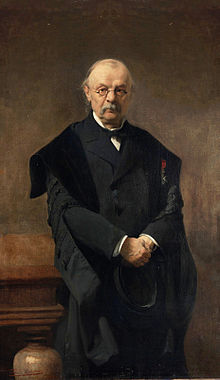Eugène Charles Catalan

Eugène Charles Catalan (born May 30, 1814 in Bruges , † February 14, 1894 ) was a Belgian mathematician .
Life
Catalan was born in Belgium and trained at the École polytechnique in Paris , where he met Joseph Liouville . In 1834 he was expelled from the university and went to Châlons-sur-Marne , where he got a job after graduation. He returned to the École Polytechnique in 1838 with the help of Liouville to teach descriptive geometry. In 1865 he followed a call to the University of Liège . In 1881 he was accepted as a corresponding member of the Russian Academy of Sciences in Saint Petersburg .
job
Catalan worked on continued fractions , descriptive geometry , number theory, and combinatorics . He published the famous Catalan Conjecture in 1844, which was only proven in 2002 by Preda Mihăilescu . Its name bears a unique, periodic structure that it came across in 1855. He worked out the Catalan numbers to solve a combinatorial problem. The Catalan constant , the Catalan solids ( dual polyhedra to the Archimedean solids ) and the identity of Catalan for Fibonacci numbers are also named after him, as well as the Catalan surface .
bibliography
- François Jongmans: Une élection orageuse à l'Institut . In: Bulletin de la société royale des Sciences de Liège . 55ème année. No. 5-6 , 1986, pp. 581-603 .
- François Jongmans: Eugène Catalan . Géomètre sans patrie - républicain sans république. Société belge des professeurs de mathématiques d'expression française, 1996.
Fonts
- Théorèmes et Problèmes Géométrie élémentaire, Brussels, 2nd edition 1852, 6th edition 1879
- Elements de géométrie, 1843
- Traité élémentaire de géométrie descriptive, 2 volumes 1850, 1852, 5th edition 1881
- Nouveau manuel des aspirants au baccalauréat ès sciences, 1852 (12 editions of the book)
- Solutions of the problem of mathematic et de physique donnés à la Sorbonne dans les compositions du baccalauréat ès sciences, 1855/56
- Manuel des candidats à l'École Polytechnique, 2 volumes, 1857-58
- Notions d'astronomie, 1860 (the book saw 6 editions)
- Traité élémentaire des séries, 1860
- Histoire d'un concours, 1865, 2nd edition 1867
- Cours d'analysis de l'université de Liège, 1870, 2nd edition 1880
Web links
- http://villemin.gerard.free.fr/Esprit/Catalan.htm (English)
- John J. O'Connor, Edmund F. Robertson : Eugène Charles Catalan. In: MacTutor History of Mathematics archive .
- Spektrum.de: Eugène Charles Catalan (1814–1894) November 1, 2014
Individual evidence
- ^ Foreign members of the Russian Academy of Sciences since 1724. Eugène Charles Catalan. Russian Academy of Sciences, accessed September 5, 2015 (Russian).
| personal data | |
|---|---|
| SURNAME | Catalan, Eugène Charles |
| BRIEF DESCRIPTION | Belgian mathematician |
| DATE OF BIRTH | May 30, 1814 |
| PLACE OF BIRTH | Bruges |
| DATE OF DEATH | February 14, 1894 |
